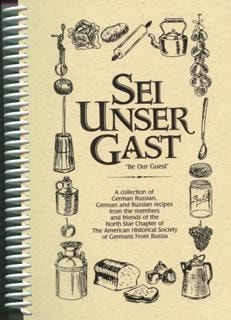Sei Unser Gast is a cookbook compiled by the North Star Chapter of Minnesota, it provides a brief history as well as the "how to" when making these traditional dishes from the German Russian style of cooking.
Share your German-Russian heritage with family and friends. Sei Unser Gast cookbooks make the perfect gift for birthdays, graduations, showers, weddings, anniversaries, and holidays. Give them to say “Danke schön.” Donate copies to the libraries and schools in your community.
Sei Unser Gast cookbooks are sold at some North Star Chapter meetings.
Share your German-Russian heritage with family and friends. Sei Unser Gast cookbooks make the perfect gift for birthdays, graduations, showers, weddings, anniversaries, and holidays. Give them to say “Danke schön.” Donate copies to the libraries and schools in your community.
Sei Unser Gast cookbooks are sold at some North Star Chapter meetings.
A Bit about a Cookbook like None Other
as written by Paulette Tobin
The cookbook's title, literally "Be Our Guest" is from a table prayer familiar to many German families in the Dakotas. My grandfather, Gustav Haupt, used to pray it every time he sat down to dinner with us: "Kom Herr Jesu, sei unser Gast, und segne alles, was du uns aus Gnade bescheret hast." "Come Lord Jesus, be our guest and bless all that you through your grace have bestowed on us." "Sei Unser Gast" was published to raise money for North Star Activities and to acquaint people with German Russian cookery. But most important, the group wanted to document German Russian cuisine and food ways so that present and future generations could enjoy it. To someone like me, who grew up in a Germans-from-Russia family in Eureka, SD, it still sounds funny to read about "German Russian cuisine." As my mother likes to say "We're German. We don't dine - we eat." But I would say these recipes are worthy of being served anywhere. An especially fine chapter is the one on soups, including wonderful rivel soup and borscht, a beef soup that Germans adapted from the Ukraines. There's also roast duck with sauerkraut stuffing, hasenpfeffer, halupsi (pigs in the blankets), and pheasant fricassee. A chicken and noodles recipe includes these instructions: "If you happen to butcher the old hen yourself, save the feet. Scald them extra hard, then peel the scales off and remove the toenails with pliers. Cook the feet with the hen and the broth will have an extra dose of gelatin. Remove the feet from the broth when the hen is cooked. Grandma would eat the feet when they were nice and tender but then she'd also clean and cook the head with the rest of the bird. She'd eat the comb, split the skull and give the nugget of brain to whichever grandchild was lucky enough to be sitting next to her."
In my family we sometimes ate the chicken feet, but never the heads. Some people consider chicken feet a real delicacy, but we were more likely to freeze them after butchering and save them for winter, when we would cook them and feed them to our dogs. I have a feeling that admitted this is not going to endear me to the German traditionalists out there. In addition to entrees, this book will tell you how to make chamomile tea, wild currant wine and lye soap just like Grandma did.
as written by Paulette Tobin
The cookbook's title, literally "Be Our Guest" is from a table prayer familiar to many German families in the Dakotas. My grandfather, Gustav Haupt, used to pray it every time he sat down to dinner with us: "Kom Herr Jesu, sei unser Gast, und segne alles, was du uns aus Gnade bescheret hast." "Come Lord Jesus, be our guest and bless all that you through your grace have bestowed on us." "Sei Unser Gast" was published to raise money for North Star Activities and to acquaint people with German Russian cookery. But most important, the group wanted to document German Russian cuisine and food ways so that present and future generations could enjoy it. To someone like me, who grew up in a Germans-from-Russia family in Eureka, SD, it still sounds funny to read about "German Russian cuisine." As my mother likes to say "We're German. We don't dine - we eat." But I would say these recipes are worthy of being served anywhere. An especially fine chapter is the one on soups, including wonderful rivel soup and borscht, a beef soup that Germans adapted from the Ukraines. There's also roast duck with sauerkraut stuffing, hasenpfeffer, halupsi (pigs in the blankets), and pheasant fricassee. A chicken and noodles recipe includes these instructions: "If you happen to butcher the old hen yourself, save the feet. Scald them extra hard, then peel the scales off and remove the toenails with pliers. Cook the feet with the hen and the broth will have an extra dose of gelatin. Remove the feet from the broth when the hen is cooked. Grandma would eat the feet when they were nice and tender but then she'd also clean and cook the head with the rest of the bird. She'd eat the comb, split the skull and give the nugget of brain to whichever grandchild was lucky enough to be sitting next to her."
In my family we sometimes ate the chicken feet, but never the heads. Some people consider chicken feet a real delicacy, but we were more likely to freeze them after butchering and save them for winter, when we would cook them and feed them to our dogs. I have a feeling that admitted this is not going to endear me to the German traditionalists out there. In addition to entrees, this book will tell you how to make chamomile tea, wild currant wine and lye soap just like Grandma did.
